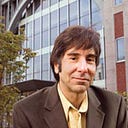“The Referee Has Spoken”: How An Academic Changed BBC Policy on Debating Climate Change with a Tweet
On July 31, 2018, British philosopher Rupert Read, who teaches at the University of East Anglia, did what is unthinkable to most academics: he declined an opportunity to be a guest on a BBC radio program. His denial lead to an important change in BBC policy and has set an example we all need to follow.
Read is one of the foremost Wittgenstein scholars in the world. He is also an environmental philosopher and is deeply involved with the British Green Party. He has served as a Green Party Councilor for Norwich (U.K.) and is the Chair of the Green House Think Tank.
Read was asked by BBC to debate a climate denier.
Read, who has done many of these debates over the years, refused to participate. The scientific consensus overwhelmingly supports the reality of anthropogenic climate change that threatens our survival. Read took the position that it was irresponsible for the BBC to create the illusion of “balance” between that consensus and the lobby of vested interests that exists solely to create doubt about it. He analogized debating anthropogenic climate change with debating whether smoking cigarettes is harmful or whether the earth is flat.
Read indicated that he was all in favor of debating how best to deal with the reality of climate change. He rejected debating whether the reality is a reality.
In many ways, although Read’s response to the BBC was surprising, it did not come as a surprise to those who know Read’s work. For some years now, Read has been passionately promoting green regulation based on an idea that he has helped to shape called the Precautionary Principle. This principle maintains that, even if there is some scientific uncertainty surrounding some matter, we ought to regulate if there is any realistic chance that catastrophe may result if we do not regulate. Read just took this to the next level: where there is virtually no scientific uncertainty — where the consensus is clear and strong — taking protective measures becomes the only rational thing to do. Pretending otherwise is simply irresponsible.
Read tweeted about his refusal to participate on July 31 and by the time he got up on August 1, he had 10,000 RTs. And the RTs continued. One of those who retweeted was Richard Sambrook, former head of news at the BBC. (At last check, Read’s initial tweet had 42,000 RTs and 60,000 likes.) Read wrote a Guardian Op-ed explaining his position and he then organized a letter that was signed by 61 academics, writers, and politicians. The letter stated, in part: “[W] e will no longer debate those who deny that human-caused climate change is real. There are plenty of vital debates to be had around climate chaos and what to do about it; this is simply no longer one of them. We urge broadcasters to move on, as we are doing.”
Read’s letter, joined in by the supporting signatories, was published in the Guardian on August 26. On September 7, the Guardian reported on a memo leaked from the BBC that said, in part: “Manmade climate change exists: If the science proves it we should report it.” The memo warned BBC staff about being aware of false balance and stated: “To achieve impartiality, you do not need to include outright deniers of climate change in BBC coverage, in the same way you would not have someone denying that Manchester United won 2–0 last Saturday. The referee has spoken.” The BBC has refused to comment on the leaked memo.
Rupert Read is to be congratulated for getting the BBC to change its policy about “debating” climate change. We need to follow his lead. To continue to debate whether anthropogenic climate change exists is morally and intellectually irresponsible. The referee has, indeed, spoken. We should direct our efforts to discussing and debating solutions to a problem that threatens the existence of life on earth, rather than promoting some foolish idea of “balance” where the weight exists only on one side.
To do otherwise is to embrace catastrophe.
______________________________
Gary L. Francione was one of the signers of the letter that Professor Read drafted and that was published in the Guardian.
